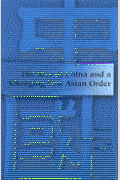For more information on President Trump’s trip and analysis from Brookings experts, make sure to check out the Center for East Asia Policy Studies and the John L. Thornton China Center, and subscribe to our newsletters on the political, security, and economic issues facing East Asia.
Earlier this month and coinciding with the one-year anniversary of his election, President Trump set out on an 11-day trip to five Asian countries: China, Japan, South Korea, Vietnam, and the Philippines.
In his first year in office, Trump has withdrawn the United States from the Trans-Pacific Partnership (TPP) and the Paris Climate Accords, threats from a nuclear North Korea have escalated dramatically, and China has taken new steps to increase its influence as a regional power. Questions about these issues loomed over Trump’s meetings with Asian leaders—what policy outcomes, if any, did his marathon trip produce?
Setting expectations
According to Lynn Kuok, a nonresident senior fellow with the Center for East Asia Policy Studies, faith in the president’s judgement has sharply declined in Asia, and insecurities about America’s perceived abandonment of the region have heightened as a result of the president’s “capriciousness in tearing up agreements,” threats of war, and reluctance to champion free trade. For many reasons, Kuok argued, the expectations that Trump’s trip would produce substantive policy takeaways were low.
Ryan Hass, a David M. Rubenstein fellow in Foreign Policy, saw the trip as an opportunity for Trump to fortify U.S. standing in Asia amid questions about its commitment to playing a leadership role. In the short audio clip below, he foreshadowed the president’s trip by explaining the issues and challenges Trump would face, and offered advice to president.
As the director for China, Taiwan, and Mongolia at the National Security Council during the Obama administration, Hass helped prepare for a number of these trips. Before Trump left, Hass noted the administration’s relatively diminished preparations and suggested that the endeavor would ultimately be an “unconventional trip by an unconventional president” with a greater focus on thematic signaling than concrete outcomes and deliverables.
Trump took clear steps away from multilateralism
President Trump used his speech at the Asia-Pacific Economic Cooperation (APEC) summit in Vietnam to double-down on his opposition to multilateral trade agreements like the TPP, and instead, voiced his intention to sign a series of bilateral trade deals. According to Center for East Asia Policy Studies Senior Fellow Jonathan Stromseth and Hass, this idea has essentially “fallen flat,” as no leader has approached President Trump to negotiate new bilateral trade deals and all of the remaining members of the TPP have agreed to move forward without the United States.
In a recent blog post and in an episode of the 5 on 45 podcast, Mireya Solís, senior fellow and co-director of the Center for East Asia Policy Studies, explains how the Trump administration is fundamentally reshaping America’s role in the region and the implications for multilateralism and trade diplomacy in East Asia.
The need for a clear, unified voice on North Korea
According to David Dollar, senior fellow in the John L. Thornton China Center, it was important that President Trump clearly and publicly show that the United States is aligned with Japan, South Korea, and China to mitigate the threat of a nuclear North Korea. Tensions in the region have risen recently as North Korea launched two ballistic missiles over Japan only a couple of months prior to the trip.
According to Jung H. Pak, senior fellow in the Center for East Asia Policy Studies and the SK-Korea Foundation Chair in Korea Studies, we are not close to another Korean War or any serious conflict on the peninsula, despite Kim Jung-un’s provocative behavior. Pak writes that Kim’s actions are primarily oriented toward regime survival and avoiding military confrontation, and that he likely sees Trump’s threats as meaningless.
Pak also suggests that after toning down the unnecessary tweets and comments, President Trump should allow sanctions from the United Nations Security Council and recent executive orders the chance to pressure Kim’s regime, consult more closely with China and Russia (who have previously diluted sanctions), and reinforce the U.S. commitment to the defense of Japan and South Korea.
Dollar also wrote that Trump and his team are pushing China to cut off petroleum supplies and apply more pressure on North Korea—something they have been reluctant to do in order to ensure that Kim Jung-un’s regime does not collapse.
China is pursuing an increasing role in the region
Asia is at an inflection point, with a rapidly rising China increasingly demonstrating its ambition to reassume its historic role as the region’s central actor.
If the United States is drawing back from the region, is China stepping in? Though it may be in rhetoric alone, as Mireya Solís notes, Chinese foreign direct investment and the Belt and Road Initiative are seen as methods to expand Beijing’s global influence. Ryan Hass and Alex Pascal put it clearly when they wrote that “Asia is at an inflection point, with a rapidly rising China increasingly demonstrating its ambition to reassume its historic role as the region’s central actor.”
Hass and Pascal recommend that the United States lean on its relationships with its European partners to help guide China’s growth in a constructive direction. The United States and Europe share many of the same economic and security concerns in relation to China, and working together to set boundaries on what is acceptable economic and strategic statecraft could help to ensure that, in their words, the “global rules-based order continues to prevail in the wider Asia-Pacific region.”
On trade, Trump has routinely scolded China for creating rules that disadvantage U.S. firms, limit markets, and contribute to the growing trade imbalances. During his visit to Beijing however, the president placed blame for the current state of the trade relationship not on China, but on previous U.S. presidents.
The trip resulted in no significant changes to China’s market access or trading policies, according to David Dollar, but change might come down the road as a result of the administration’s Section 301 investigation into China’s unfair trading policies.
The Brookings Institution is committed to quality, independence, and impact.
We are supported by a diverse array of funders. In line with our values and policies, each Brookings publication represents the sole views of its author(s).







Commentary
What Brookings experts said about Trump’s marathon trip to Asia
November 22, 2017